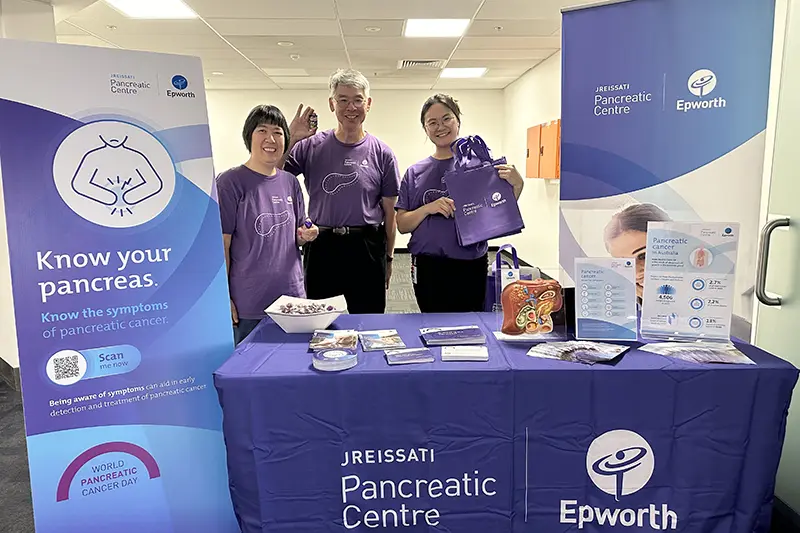Let’s change the conversation about pancreatic cancer.
It starts with awareness.
Take our quick six question quiz to test your knowledge and learn more about this vital organ, pancreatic cancer symptoms, and why early detection matters.
How well do you know your pancreas? Take the quiz!
Why it matters
Pancreatic cancer is one of the deadliest common cancers in Australia.
It is often diagnosed too late, when treatment options are limited.
Knowing the signs, symptoms and risk factors can lead to earlier detection and better outcomes.
What is Pancreatic Cancer?
Lighting it purple for World Pancreatic Cancer Day
We are proud to be a member of the Australian Pancreatic Cancer Alliance, and working together with organisations across the country (including Purple Our World, the AGITG / GI Cancer Institute, Pankind, Dare to Hope, Pancare, Garvan Institute, Cancer Australia and Team Lopez Foundation) to raise awareness and improve outcomes.
On Thursday 20 November, landmarks across Australia including the Jreissati Pancreatic Centre at 19 Erin Street will be lit purple as part of a national show of support. This coordinated Light Up campaign is part of a global effort led by the World Pancreatic Cancer Coalition to spotlight the need for earlier detection, better treatments and greater support for patients and families.
Keep an eye out for local buildings shining purple in your area, and help spread the word online using #HelloPancreas, #LightItPurple and #PancreaticCancerAustralia.
Did you know? Pancreatic cancer in Australia
-
4,800 Australians are diagnosed each year
-
80% are diagnosed at an advanced stage
-
It is the third leading cause of cancer death
-
Only 13% survive beyond five years
-
Early diagnosis can double survival
More information
Early signs and warning symptoms of pancreatic cancer
Could you or a loved one be at increased risk?
Some people have a higher risk of pancreatic cancer due to family history or inherited gene changes.
The APRISE Program is a national research study that offers pancreatic cancer screening for eligible people at higher risk. Screening includes MRI or endoscopic ultrasound.
Learn more about the APRISE program in our interview with Inherited Cancers Australia
Learn more about the APRISE Program
Living with cancer resources
If you or someone you care about is living with pancreatic cancer, we have a range of free, evidence-based resources to support you.
These include:
- The My Care Plan diary to help track treatments, symptoms and appointments
- Practical guides and videos to better understand treatment pathways
- Tools to help you navigate diagnosis and care, wherever you are in your journey
No one should face pancreatic cancer alone.
Email us for more information at [email protected].
Free resources for health professionals
We offer a suite of free educational tools to support your practice and help raise awareness about pancreatic and upper gastrointestinal cancers.
Resources include:
- A 3D pop-up book of the gastrointestinal tract for patient education
- A clinic poster series covering symptoms and early detection
- A curated awareness and education pack suitable for display in general practices and specialist clinics
- An interactive GP decision support tool to help streamline investigations for suspected pancreatic cancer
To request a free copy of these resources, please email us at [email protected]
Support the Centre
Shining a light on pancreatic cancer this November. Your support can make a real difference for those who need it most.
Contact the Centre
Phone us on: 03 9426 8880
Pancreatic Nurse Coordinator: 0428 658 039
APRISE screening program: 0418 370 684
Email: [email protected]

